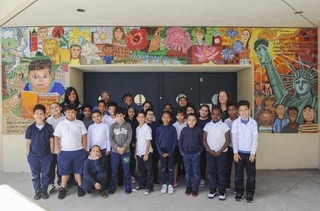Thoughts On Democracy and the Arts
David Fichter
Muralist and Public Artist

The Frost Elementary School, Lawrence, MA, created by and courtesy of David Fichter
“Art is not just to show life as it is but to show life as it should be.” --Paul Robeson
“In the dark times will there be singing? Yes, there will be singing about the dark times.” --Bertolt Brecht
I support community cultural participation, cultural pluralism, and the integration of culture with our democratic aspirations. The struggle for democracy is both political and cultural. In a democratic society, we are each entitled to a name, a song, and a story, regardless of our backgrounds or our wealth. The concept of democracy should include not just political expression, but also cultural expression in whatever form it takes, preferably at a community, grassroots level, leading to healthy relationships based on mutual respect and fundamental values, including respect for our differences.
Last night I watched a beautiful film – Sing Sing - based on the true story of a prison theater program, “Rehabilitation Through the Arts.” What its inmate actors/theater artists made beautifully clear by the end of the film is how essential storytelling and cultural expression are to the human identity and spirit, and how they build a foundation for community. Even in a harsh environment like a maximum-security prison, cultural expression reinforces democratic values of listening and mutual respect. Former President George W. Bush was not someone I could support politically, but one important thing he did was to appoint a director to the NEA (National Endowment for the Arts) who started a program to bring Shakespeare to the military and to other underserved communities. My daughter, a theater artist, has led workshops at West Point, where every cadet must perform a monologue from Shakespeare; she feels it is an invaluable and perspective-shifting experience for both the artists and the cadets. I believe we are all more fully human when we have opportunities to explore and share our stories, to have our cultural expressions respected and supported in our communities. Democracy is best served and preserved when the arts are an integral part of our lives.
When I started my career as a public artist in the early 1980’s, I was commissioned to paint a mural on the outside of a neighborhood health center in Lawrence, Massachusetts. Lawrence is known as the “Immigrant City” because of its long history as a textile industry powerhouse. During the 19th and early 20th centuries, Lawrence attracted waves of immigrants from Europe to work in the textile mills. Since the 1950’s the immigrants have come mostly from Latin America. I was interested in telling the stories of these two waves of immigrants from different parts of the world who both faced similar challenges of prejudice, conflict, and poverty. During the 1980’s, conflicts between those older generations of immigrants and the newer ones (who were fast becoming the majority) broke out in violence. I felt the goal of the mural was to tell the stories of these different generations of immigrants, who faced similar challenges, as a means of bridging divides in Lawrence. The biggest challenges are the issues of power, representation, and democracy. The arts can play a dynamic role in fostering connection and community, the foundation of democracy. Painting outdoors directly on the health center walls, I was constantly interacting with the surrounding community, receiving curious interest and feedback. Young people were especially interested in participating, so I decided I would continue the collaboration over the next 15 years by working directly in Lawrence public schools to create many murals and mosaics with the children of immigrants, providing opportunities for cultural expression which is essential.
